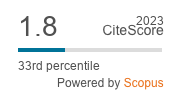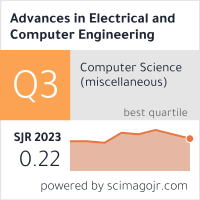| 4/2014 - 4 |
Incentive Driven Distributed Generation Planning with Renewable Energy ResourcesKAUR, S. |
| Extra paper information in |
| Click to see author's profile in |
| Download PDF |
Author keywords
distributed power generation, heuristic algorithms, optimization, power generation planning, sustainable development
References keywords
power(10), energy(10), planning(9), optimization(9), generation(9), distributed(9), distribution(8), systems(6), system(6), search(6)
Blue keywords are present in both the references section and the paper title.
About this article
Date of Publication: 2014-11-30
Volume 14, Issue 4, Year 2014, On page(s): 21 - 28
ISSN: 1582-7445, e-ISSN: 1844-7600
Digital Object Identifier: 10.4316/AECE.2014.04004
Web of Science Accession Number: 000348772500004
SCOPUS ID: 84921651204
Abstract
Renewable DGs may not be economically viable due to the stochastic generation and huge capital investment, but are an inevitable choice for sustainable energy development and future planning. An appropriate incentive scheme for clean Distributed Generation (DG) technologies is able to address this issue in an economical manner and is considered in proposed distributed generation planning model. The proposed model minimizes the annualized cost with Emission Offset Incentive (EOI) and the penalty for Green-house Gas (GHG) emissions. A meta-heuristic approach with dynamic tuning of control parameters is adopted to improve the success and the convergence rate of optimal solutions. The algorithm provides the optimal solution in terms of type, size, and location of DG. The proposed technique is implemented on IEEE 33-bus system. Proposed model helps the Distribution Network Operators (DNOs) to decide the proper DG technology from an economic prospective for eco-friendly energy planning. |
| References | | | Cited By |
Web of Science® Times Cited: 3 [View]
View record in Web of Science® [View]
View Related Records® [View]
Updated 2 days, 2 hours ago
SCOPUS® Times Cited: 3
View record in SCOPUS® [Free preview]
View citations in SCOPUS® [Free preview]
[1] Real Measure of a Transmission Line Data with Load Fore-cast Model for The Future, YILMAZ, Musa, Balkan Journal of Electrical and Computer Engineering, ISSN 2147-284X, Issue 2, Volume 6, 2018.
Digital Object Identifier: 10.17694/bajece.419646 [CrossRef]
[2] A novel generation and capacitor integration technique for today's distribution systems, ÖZGÖNENEL, Okan, KARAGÖL, Serap, TURKISH JOURNAL OF ELECTRICAL ENGINEERING & COMPUTER SCIENCES, ISSN 1300-0632, Issue , 2017.
Digital Object Identifier: 10.3906/elk-1602-197 [CrossRef]
[3] A hybrid approach for promoting low carbon technologies in distributed generation planning, Kaur, Sandeep, Kaur, Manmeet, Kumbhar, Ganesh, Khanna, Rintu, 2017 IEEE International Conference on Smart Grid and Smart Cities (ICSGSC), ISBN 978-1-5386-0504-2, 2017.
Digital Object Identifier: 10.1109/ICSGSC.2017.8038555 [CrossRef]
[4] An integrated approach for power loss reduction in primary distribution system, Pawar, Badopant, Kaur, Sandeep, Kumbhar, G. B., 2016 IEEE 6th International Conference on Power Systems (ICPS), ISBN 978-1-5090-0128-6, 2016.
Digital Object Identifier: 10.1109/ICPES.2016.7584049 [CrossRef]
Disclaimer: All information displayed above was retrieved by using remote connections to respective databases. For the best user experience, we update all data by using background processes, and use caches in order to reduce the load on the servers we retrieve the information from. As we have no control on the availability of the database servers and sometimes the Internet connectivity may be affected, we do not guarantee the information is correct or complete. For the most accurate data, please always consult the database sites directly. Some external links require authentication or an institutional subscription.
Web of Science® is a registered trademark of Clarivate Analytics, Scopus® is a registered trademark of Elsevier B.V., other product names, company names, brand names, trademarks and logos are the property of their respective owners.
Faculty of Electrical Engineering and Computer Science
Stefan cel Mare University of Suceava, Romania
All rights reserved: Advances in Electrical and Computer Engineering is a registered trademark of the Stefan cel Mare University of Suceava. No part of this publication may be reproduced, stored in a retrieval system, photocopied, recorded or archived, without the written permission from the Editor. When authors submit their papers for publication, they agree that the copyright for their article be transferred to the Faculty of Electrical Engineering and Computer Science, Stefan cel Mare University of Suceava, Romania, if and only if the articles are accepted for publication. The copyright covers the exclusive rights to reproduce and distribute the article, including reprints and translations.
Permission for other use: The copyright owner's consent does not extend to copying for general distribution, for promotion, for creating new works, or for resale. Specific written permission must be obtained from the Editor for such copying. Direct linking to files hosted on this website is strictly prohibited.
Disclaimer: Whilst every effort is made by the publishers and editorial board to see that no inaccurate or misleading data, opinions or statements appear in this journal, they wish to make it clear that all information and opinions formulated in the articles, as well as linguistic accuracy, are the sole responsibility of the author.





